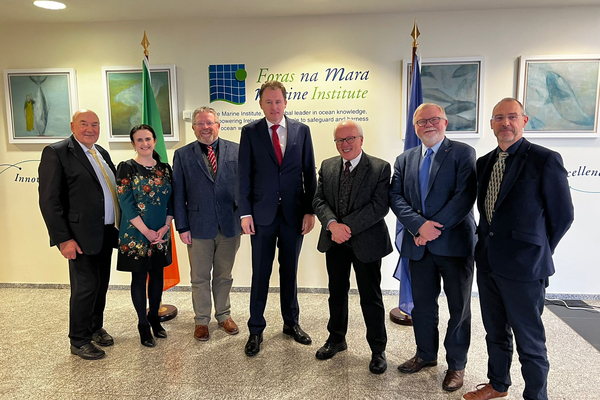Minister for Agriculture, Food and the Marine, Charlie McConalogue, visited the Marine Institute in Galway and received the Marine Institute’s annual 2022 Fish Stock Book. The detailed annual publication provides the latest impartial scientific advice on the status of 75 key fish stocks of interest to Ireland.
Minister Charlie McConalogue said, “I am delighted to visit the Marine Institute today and to receive the Fish Stock Book for 2022. This provides essential information reviewing the state of fish stocks in 2022 and provides management advice for the setting of quotas for 2023. I am pleased that the work done by the Marine Institute scientists, feeding into the work of the International Council for the Exploration of the Seas (ICES), ensures that decisions we are making at the December Fisheries Council and in negotiations with Third Countries, including the UK, are based on quality data collected over the past year and advice that has been assessed and verified. It is important that the advice and the science underpinning that advice is made accessible to industry and other stakeholders through the continued annual publication of the Fish Stock Book.”
“The Marine Institute’s 2022 Fish Stock Book is showing a continued gradual increase in the number of sustainably fished stocks. This progress is giving assurance that our policy at national and EU level is making progress on delivering sustainability. Stocks of haddock, monkfish, megrim, tuna, and some of the Dublin Bay Prawn stocks have increased in recent years and continue to be sustainably fished. There are some stocks such as cod, herring and whiting that are overfished and work will continue to set management measures that will support the rebuilding of these important stocks.”
This is the 30th edition of the annual book, which contains the latest management advice used by decision makers to set sustainable catch levels and fishing quotas for 2023. The publication is an invaluable reference guide for a wide audience, including the Minister’s team of negotiators, the fishing industry, marine scientists, environmental NGOs and third level institutes.
In 2021, Irish vessels landed approximately 182,000 tonnes of wild caught fish worth more than €265 million at first sale. This, in turn, supports a valuable processing industry and other activities in our coastal communities.
Ensuring long term sustainability is a key objective of sustainable management of fish stock under the Common Fisheries policy. To that end, every year, the Marine Institute undertakes an extensive data collection programme on multiple scientific fisheries surveys, travelling approximately 23,776 nautical miles over 200 days, equating to 2,030 scientist days at sea on Ireland’s marine research vessels.
Onshore and at sea sampling programmes measure over half a million fish and estimate age for a further 56,000 individuals across all commercial species. Irish data are compiled with that from other countries through the intergovernmental organisation ICES. Marine Institute scientists play a key role in carrying out the assessments and developing the scientific evidence and advice at ICES. The Stock Book integrates the latest scientific advice from ICES with relevant information on Irish fisheries.
Dr Paul Connolly, CEO of the Marine Institute said, “the scientific advice and services provided by our scientists to stakeholders are essential to supporting a sustainable ocean economy, protecting and managing our marine ecosystems and meeting EU obligations. Our scientists participate in, and lead, international working groups that assess fish stocks and provide the independent scientific advice on how many fish can be safely removed from this renewable resource. This work is essential to sustaining the ocean economy for our coastal communities.”
Dr Ciaran Kelly, Director of Fisheries Ecosystem Advisory Services at the Marine Institute said, “the arrival of Ireland’s new research vessel, the RV Tom Crean this year, provides us with a state-of the-art platform to undertake fisheries assessments in Irish waters. The RV Tom Crean and RV Celtic Explorer, enable our scientists to gather the best scientific evidence to help inform important decisions on fisheries management, and ocean sustainability.”
The 2022 Stock Book is available electronically on the Marine Institute’s website and as an interactive online application. Most of the scientific work that delivers the Marine Institute’s Stock Book is funded under the European Maritime, Fisheries and Aquaculture Fund (EMFAF).



